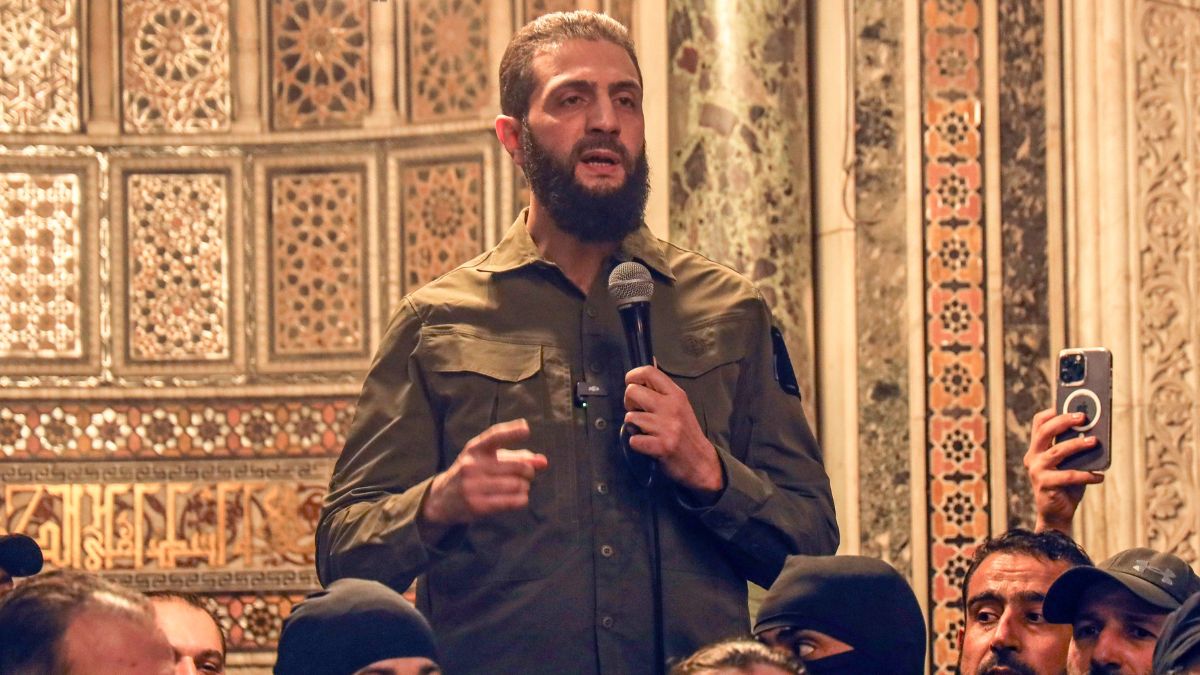Between Erdogan and Al-Sharaa: Syrian Kurds battle for survival
 Abu Mohammed al-Jolani | Reuters
Abu Mohammed al-Jolani | Reuters
Although President Ahmad Al-Sharaa managed to clinch a surprise meeting with President Donald Trump in Saudi Arabia a few days ago, the political situation in Syria remains far from stable. The country faces chaos, civil strife and external meddling, and for its significant Kurdish minority, the future appears increasingly uncertain. Their prospects seem to be shaped by multiple overlapping regional conflicts, political fragmentation within the community and the ever-changing international dynamics.
While the leading Kurdish militia, the Syrian Democratic Forces (SDF) and its political wing, the Syrian Democratic Council (SDC), have managed to make major strides in building a decentralised governance model in the Syrian northeast, it faces strong resistance from the transitional government led by Al-Sharaa in Damascus, and also from neighbouring Turkey, which exerts significant influence over the new Syrian government dominated by Hay’at Tahrir al-Sham (HTS), a hardline Islamist faction once affiliated to Al Qaeda.
Al-Sharaa’s recent rejection of federalism as part of Syria’s post-conflict political order underscores the depth of this resistance. On April 27, the president explicitly dismissed the SDF’s proposal for a decentralised state, describing it a threat to national unity and a violation of an earlier agreement between the two parties. His administration’s decision to maintain Syria’s name as the “Syrian Arab Republic,” reinforce Sharia and designate Arabic as the sole official language has alienated not only Kurds, but also other minority groups, who had hoped the transitional framework would reflect Syria’s pluralistic reality.
Despite signing a deal with the central government to integrate the SDF into state institutions, the Kurdish leadership continues to advocate for autonomy. Ilham Ahmed, a senior SDC figure, has stated that the self-administration model developed in northeast Syria could be a blueprint for the entire country. However, in the eyes of the Al-Sharaa government, such demands contradict the centralising tendencies of the interim constitution. The gulf between the two positions suggests that, for now, meaningful Kurdish participation in state reform is unlikely.
On the ground, the Kurds remain under intense military and economic pressure. Turkish-backed forces are active in northern Syria, targeting Kurdish militias that Ankara believes to be working with the banned Kurdistan Workers’ Party (PKK). But the PKK formally announced its dissolution on May 12, ending more than four decades of armed insurgency against the Turkish state. The announcement followed a call in February by imprisoned PKK leader Abdullah Öcalan for the group to abandon its armed struggle.
Though SDF commander Mazloum Abdi has publicly proposed ceasefires and demilitarised zones to reduce tensions, Turkey has maintained its hardline stance. Ankara sees any form of Kurdish self-rule on its southern border as a direct security threat and is unlikely to back down unless assured of the total dismantling of PKK-affiliated groups.
The SDF continues to talk to the Al-Sharaa government as the Kurds try to broaden their political alliances and reduce hostilities, but it is also clearly a sign of desperation. The never-ending conflict and the economic isolation have taken a toll. Kurdish regions are now hampered by closed trade routes, limited oil sales and declining western aid. Escalating civil war has resulted in major damage to critical infrastructure like the Tishreen and Tabqa dams, exacerbating water and electricity shortages and endangering food security.
Yet, the Kurds carry on with their political project, particularly in Rojava, experimenting with grassroots democracy and gender equality, a novelty in the region. The governance model in Rojava focuses on participatory democracy, ecological sustainability and women’s rights. But as the Al Shara administration tightens its hold over Damascus, and with Turkey getting involved over Syrian affairs on a day-to-day basis, those achievements are becoming increasingly vulnerable. In areas like Idlib, where the transition government’s conservative rule has stripped women of basic rights, Kurdish women fear that any rollback of autonomy would jeopardise the progress made since 2013.
Internationally, support for Kurdish autonomy is going down quickly now that Assad is no longer a threat. The United States, once a key backer of the SDF in the fight against Islamic State, is now preoccupied with disengaging from Middle Eastern conflicts, especially under President Trump. Saudi Arabia, which is another key player, wants to use the Kurds as a counterweight to Iranian influence, but it has stopped short of offering them concrete support, as Riyadh is wary of jeopardising Syria’s territorial integrity. This leaves the Kurds with few reliable allies.
A ray of hope perhaps comes from neighbouring Iraq where Kurds have a stable presence at the moment. Iraqi Kurds have offered rhetorical and symbolic support, urging unity among their Syrian brethren and pointing towards their own autonomy which could be instructive. However, given the internal strife between the two major Iraqi Kurdish groups, the Kurdistan Democratic Party and the Patriotic Union of Kurdistan, even Iraqi Kurdistan is struggling to maintain its autonomy.
At the moment, the future of Kurds in Syria is fraught with uncertainty. While Kurdish groups have demonstrated resilience, the new government in Damascus is keen on centralisation and tight control. Another challenge is a hostile Turkey and dwindling international support. Unless the existing political situation shifts drastically, facilitating greater inclusivity and decentralisation, the Kurds may find their hard-won gains slipping away gradually.
Middle East